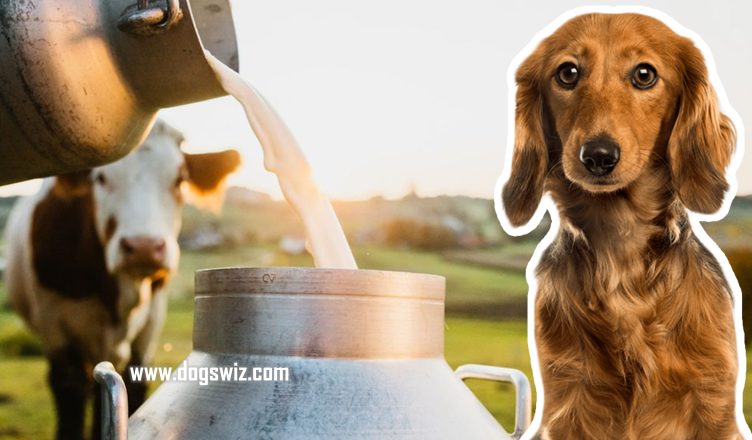The question of whether or not dogs can drink cow’s milk is often debated. There are many people who say that it’s okay to give dogs cow’s milk, while others insist that it should be avoided because of the possible health risks.
For the most part, the answer to this question ‘Can dogs drink cow’s milk?’ is no. Dogs do not have the enzyme lactase in their system, which is responsible for breaking down the lactose found in cows’ milk, making it difficult for them to digest cow’s milk. If you insist on feeding your dog cows’ milk, it may lead to vomiting and diarrhea as a result of lactose intolerance.
Lactose Intolerance And Dogs Drinking Cow Milk
As the puppies mature into adult dogs, the amount of lactase they develop decreases drastically. Lactase is an enzyme that helps to break down lactose, which is a sugar found in all dairy products. Dogs that still retain a good amount of their lactase into adulthood can digest dairy without any problems. If a dog does not have that much lactase on board, they will begin to experience digestive issues if they consume a lot of dairy products.
Most adult dogs develop lactose intolerance as they age, which is why you should always pay attention to how much milk your dog drinks and how they react after drinking milk. If the dog starts getting gassy and has diarrhea after drinking cow milk, chances are they are lactose intolerant. This is why it’s important to only give the dog a little bit of cow milk at first so you can see how they react. If they are lactose intolerant, you would want to switch the cow milk to something lower in lactose and fat.
Fat Content of Cow Milk and Health Issues It Could Lead to
As with any dairy product, be sure to watch the fat content of the milk. If your dog is already overweight or even a little bit chubby, you would not want to have them drink a lot of milk. Generally speaking, 240ml of whole cow milk contains around 3.25% fat, which might not seem like much, but regular consumption of cow milk can cause the dog to gain unwanted weight.
Furthermore, excess fat can also lead to other issues, such as bloating, gas, diarrhea, and even pancreatitis. If you notice your dog is experiencing any of these symptoms, step up the amount of exercise they are getting to work off some extra calories. You can also talk to your vet about switching to a low-fat dairy product, such as skim milk. Or you could switch to non-dairy milk, such as soy milk or almond milk.
Can Dogs Drink Cow’s Milk?
No, and to be fair, dogs don’t even need cow’s milk; they can get all of their nutrients from their daily kibble that contains these nutrients naturally. However, the vitamins and minerals in cow milk can still do some amount of good for their overall health.
Before you start giving your dog cow milk on a frequent basis, be sure to talk to your vet about it first. They will be able to tell you if the dog is lactose intolerant and if a large amount of cow milk is going to pose a problem for the dog’s health.
Conclusion
As long as your dog isn’t lactose intolerant and you don’t mind the extra calories and fat, there’s no harm in giving them a little bit of cow milk. Just be sure to monitor the dog’s reactions and pay attention to how they feel when they drink milk. If the dog begins to get gassy and has diarrhea, chances are they’re lactose intolerant and it’s time to switch out that cow milk for something else with less lactose and fat.
Thank you for reading the article.
To explore more, here are some other milk-related articles that you might be interested in.
How often do you feed cow’s milk to your dog? Did you know about the harmful effects? Or is your dog lactose intolerant? We would love to hear from you. Please share with our community in the comment section below.
